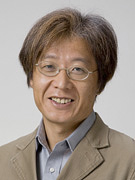Course of Human Sciences
Associate Professor NAKASHIMA Koji (Geography)
| [Theme] | Relationships between Nature and Society |
|---|

When I was in high school, I actually did not like geography so much, and in fact preferred geosciences (except for astronomy). I remember the excitement of reading Wegener's theory of continental drift and plate tectonics even though I did not fully understand them. When I asked one of my teachers about it, they told me that even in the humanities course, I would still be able to study subjects related to earth sciences with geography. Therefore, when I enrolled in university, I chose geography as my major. However, after enrolling, I was greatly disheartened at one point to learn that there was no professor at that university who specialized in physical geography. But because I was not very studious by nature, I simply went with the flow of things and ended up learning about human geography until one day when I found myself conducting research on it for a living.
Geography also has its share of different viewpoints and methodologies, but for me it was always about the study of relationships between nature and society. By this I do not mean simply the objective issues facing us such as use of natural resources or land-use, or even deforestation and global warming. Geography also encompasses an extensive range of questions including such subjective questions on the spiritual connection between nature and humanity in religion, art, philosophy, and ideologies. I am currently interested in and conducting research on the following three themes from among them.
The first is the issue of how nature has been recognized in Japanese society as well as what significance it has held for the society. While writing things in this manner, it may seem like a discourse on the topography of Japanese society. However, my real interest is in exploring the multicultural relationships between society and nature that cannot be reduced to the national character of Japanese society and culture through critical reading of this topography.
The second is the construction of a theoretical framework for thinking about these issues. In more specific terms, this is the work of utilizing the views of "social nature" to research theoretical paths for overcoming traditional views of nature based upon dichotomic values such as "natural vs. artificial,""traditional vs. modern," and "East vs. West."
The third and final task is striving to use this sort of theoretical framework to create a better relationship between society and nature. "Better" may be a vague expression; however, my aim is to search for a way to construct a relationship between nature and society based upon social and environmental justice. More specifically, I search for the means of doing the above among the local grassroots movements of Okinawa and Oita trying to reclaim areas of nature occupied by the US troops and Japanese Self Defense Forces as training grounds.
Although the above is an outline of my studies, in practice, I always try to consider the relationship between nature and society in the broadest sense without limiting myself to the previous three subjects. It is this flexibility and broadness of scope that makes geography great.

